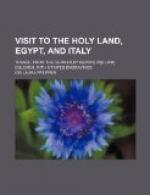October 7th.
To-day I hastened on deck before sunrise, to see as much as possible of the Sicilian coast, and to obtain an early view of Palermo. At ten o’clock we ran into the harbour of this town.
I had been so charmed with the situation of Messina that I did not expect ever to behold any thing more lovely; and yet the remembrance of this town faded from my mind when
PALERMO
rose before me, surrounded by magnificent mountains, among which the colossal rock of St. Rosalia, a huge slab of porphyry and granite, towered high in the blue air. The combination of various colours unites with its immense height and its peculiar construction to render this mountain one of the most remarkable in existence. Its summit is crowned by a temple; and a good road, partly cut out of the rock, partly supported on lofty pillars of masonry, which we can see from on board our vessel, leads to the convent of St. Rosalia, and to a chapel hidden among the hills and dedicated to the same saint.
At the foot of this mountain lies a gorgeous castle, inhabited, as my captain told me, by an English family, who pay a yearly rent of 30,000 florins for the use of it. To the left of Palermo the mountains open and shew the entrance into a broad and transcendently beautiful valley, in which the town of Monreal lies with magical effect. Several of these gaps occur along the coast, affording glimpses of the most lovely vales, with scattered villages and pretty country-seats.
The harbour of Palermo is picturesque and eminently safe. The town numbers about 130,000 inhabitants. Here, too, our deck was crowded with Fachini, innkeepers, and guides, before the anchor was fairly lowered. I inquired of the captain respecting the price of board and lodging, and afterwards made a bargain with a host before leaving the ship. By following this plan I generally escaped overcharge and inconvenience.
Arrived at the inn, I sent to Herr Schmidt, to whom I had been recommended, with the request that he would despatch a trustworthy cicerone to me, and make me a kind of daily scheme of what I was to see. This was soon done, and after hurrying over my dinner I commenced my wanderings.
I entered almost every church I passed on my way, and found them all neat and pretty. Every where I came upon picturesque villas and handsome houses, with glass doors instead of windows, their lower portion guarded by iron railings and forming little balconies. Here the women and girls sit of an evening working and talking to their heart’s content.
The streets of Palermo are far handsomer and cleaner than those of Messina. The principal among them, Toledo and Casaro, divide the town into four parts, and join in the chief square. The streets, as we pass from one into another, present a peculiar appearance, filled with bustling crowds of people moving noisily to and fro. In the Toledo Street all the tailors seem congregated together, for the shops on each side of the way are uniformly occupied by the votaries of this trade, who sit at work half in their houses and half in the street. The coffee-houses and shops are all open, so that the passers-by can obtain a full view of the wares and of the buyers and sellers.




